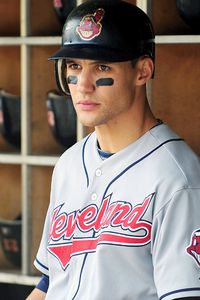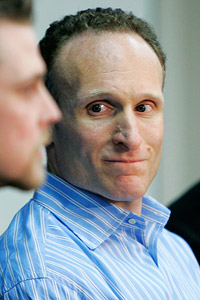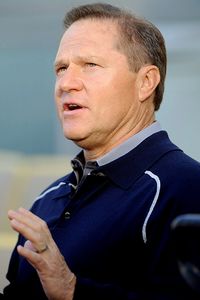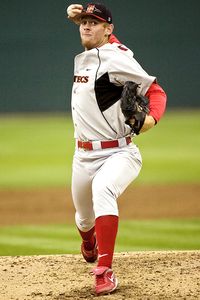It's time once again to play America's favorite second-guessing game -- What If?
Here's this week's mesmerizing hypothetical question: If baseball teams were allowed to trade draft picks, what could the Nationals get for Stephen Strasburg?
Now we understand that for many of you, this is not a question more enticing than, say: What if you were stranded on a tropical island with Heidi Klum? But humor us for a few moments and ponder this fascinating issue.
We should remind you first that in baseball, trading draft picks is not legal. But that could change -- an issue we explored just last week.
[+] Enlarge
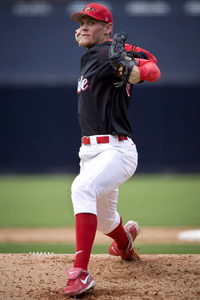
Andy Hayt/Getty ImagesAlthough Stephen Strasburg is considered a can't-miss talent, the jury is still out on how well he'll perform at a professional level.
And if it ever does change, we'll have way more fun on draft day, as teams like the Nationals contemplate whether a guy like Strasburg is as good as the hype -- or whether they should auction him off for whatever gigantic, system-reviving package they can get back.
But how gigantic would that package be? You might be surprised by the answers we got when we polled officials of four teams this week. They were hardly unanimous.
One NL executive, of a high-payroll team, had just about zero interest, believe it or not.
"I don't know that I'd be willing to give up centerpiece players until one of these once-in-a-lifetime pitchers actually proves to be a once-in-a-lifetime pitcher," he said. "Now if you were talking about a Matt Wieters-type [position player] instead of a pitcher, I'd be inclined to give up more than I would for a pitcher who I've never seen take the ball every five days."
This executive spoke for quite a few people in baseball, people who have a tough time buying into the gushing over any amateur pitcher, because they've seen too many Mark Priors and Ben McDonalds self-destruct over the years.
"I keep hearing people say he could be your second or third starter in the major leagues right now," the exec said of Strasburg. "Well, I heard that about David Price, too. And David Price had a full year in the minor leagues, and he's still scuffling in the big leagues. So am I going to trade centerpiece guys off my major league team right now for a guy who probably isn't going to realistically help you until two years down the road?
"And even if we're just talking about prospects, I'm not sure I'd want to trade my one or two best centerpiece prospects for a Cy Young award winner. So am I going to want to do it for a guy who's never thrown a professional pitch? I don't know."
An official of another club suggested, meanwhile, that the decision to trade -- or trade for -- a player like Strasburg would involve numbers way bigger than Strasburg's radar-gun readings.
"You know what could be just as big a factor as talent, is money," that exec said. "Say you're a team like Washington. Your attendance is way down, and you need the money. Wouldn't you be intrigued by the prospect of trading the guy for multiple picks, maybe two major league ready players and $10 million?"
Uh, sure. Who wouldn't? But would Bud Selig even sign off on a deal that included that much cash? We doubt it. And even if he would, how many teams could afford to send that large a bailout check in the first place?
But even the executive who proposed that idea, a guy who works for a team that theoretically might have those dollars stashed in its checking account, said he would never trade for any draft pick unless baseball institutes a formal slotting system.
"If you're trading for an established player -- let's just say Jake Peavy -- at least you know what he's going to cost you in dollars," he said. "At least you can look at the contract, and you know exactly what you're going to have to pay Jake Peavy. But right now, under this system, nobody knows what you're going to pay Stephen Strasburg. So I'd have a hard time making a deal like that. Now if you knew Strasburg was going to cost you $5 million, or even $10 million, because that's what the slot was, then it's got more reality to it."
But an official of another large-market team didn't share any of those reservations. You want to trade him Stephen Strasburg? He'd be all in.
"For a guy like this, I'd be willing to talk about three or four very good prospects, and maybe even a piece off my major league roster, depending on how important that piece is," he said. "There's a lot of baloney being thrown around right now about Ben McDonald and all the guys who didn't make it. It's a bunch of baloney. Unless all the scouts who have seen this guy are wrong, this kid is a sure-fire No. 1 or 2 starter in the major leagues. And you'd give up a lot for a guy like that."
But the question is still: What's "a lot?"
TRIVIALITY
Roy Halladay is halfway to his third 20-win season. Only two other active right-handers have won 20 games more than once. Can you name them? (Answer later.)
This official proposed a package of a highly touted young pitcher off his big league roster who is still having his ups and downs, a second ballyhooed young pitcher (currently hurt) who has had a brief and messy big league fling, and either a prospect in Double-A or his team's own No. 1 pick.
But would that really be enough? To trade away someone like Stephen Strasburg, wouldn't the Nationals have to get back another potential superstar, most likely one who is either closer to the big leagues or already in the big leagues?
"I see no way you'd give up an everyday, impact, big league player," said an executive of a fourth club. "You'd be crazy to risk that for a kid who's never played [professional baseball]. Let's say they're talking to the Orioles about Adam Jones. I'll ask you this: If you put Adam Jones back in the draft right now, who would go No. 1 -- him or Strasburg? I'd say Adam Jones. So no way you're giving up an Adam Jones for this kid. But obviously, I know what Adam Jones is now. And I think I know what he's going to be. I don't know what Stephen Strasburg is going to be."
But even if you think you do know what Strasburg -- or any top-of-the-draft mega-prospect -- is going to be, it still seems dubious that any contending team would ever deal away a meaningful big league player for any draft pick. Right?
“
Right now, the Nationals have no leverage. If they had the option to trade the pick, they'd be better off, not worse off.
”-- A club official
"To me, it would be hard to trade major league talent for draft picks, period," said the first executive. "Let's take Matt Wieters. Even as quickly as he got to the majors, think about this: He got drafted in 2007. He didn't spend any time in the major leagues in 2007. He didn't spend any time in the major leagues in 2008. And he didn't spend any time in the major leagues in the first two months of 2009. So if you've got a team in the race, would you risk your chances of getting to the postseason in 2007 and 2008 for your starting catcher in June 2009? Not a chance."
What would a team trade, then? The most likely package, said this same exec, would be made up mostly of other draft picks.
"Maybe you find a team with a bunch of compensation picks to trade with, and now maybe [the Nationals] become a team that's getting four picks in the top 18 instead of one, and the combined bonuses of all four are less than what Strasburg would have gotten," he said. "Or maybe you trade them two or three first-round picks, plus something else. That's the kind of deal I could see happening. I just don't see anybody trading their closer, or their 23-year-old starting shortstop, for Stephen Strasburg. That makes no sense."
But who knows? What makes no sense to one club might make perfect sense to another -- especially if baseball ever gets to the point where it goes to a system that includes both slotting and trading picks.
"People say, 'If you traded picks, you'd be letting [Scott] Boras manipulate the draft.' But that's a fallacy," said one club official. "Boras can manipulate the draft now . If we get to the point where we can trade picks, now the Nationals can say to Scott, 'We're not going to deal with you.' Then he trades him to me, and it's my problem. Right now, the Nationals have no leverage. If they had the option to trade the pick, they'd be better off, not worse off."
Well, maybe they would. But they'll never know -- because teams are stuck with this system, not the far better system in our little "What If" game. And because they're stuck, they can't shop this pick for Adam Jones, Pedro Alvarez or anybody else's favorite phenom. They're sentenced to a guaranteed two-month negotiating nightmare -- one they wouldn't wish on anybody.
"All I know," said one of these grateful club officials, "is, I've never been so glad not to have the first pick."
Ready To Rumble

Spilborghs
•The Spil-ling Bee: While the Phillies tread water waiting for the starting-pitching market to loosen up, they're still hunting quietly for right-handed hitting outfield depth. The latest name on their radar screen, according to clubs that have spoken with them, is Rockies energizer Ryan Spilborghs. But Spilborghs, who won't even be arbitration-eligible until next year, appears to have several other teams interested. Among the clubs known to like him: Detroit and Boston.
•Rock-A-Bye?: Despite the Rockies' recent road blitz (seven straight wins), teams that have spoken with them report that Spilborghs is one of many, many Rockies who could move. In fact, an official of one club says he was told that GM Dan O'Dowd will listen "on anyone."

StreetHuston Street (0.60 ERA since April 26) is beginning to attract interest, and the Rangers are believed to be one of the teams following him closely. And there could be a robust market on Brad Hawpe, if the Rockies decide to deal him for a package centered around young pitching.
Then there is Jason Marquis, a guy who just charged into the league lead in wins while his team was still in last place. At the moment, he appears to be a second-tier shopping option for clubs like the Phillies and Dodgers. But that could change if the aces on the All-Rumor Central team (Jake Peavy, Roy Oswalt, Cliff Lee, Roy Halladay, etc.) never actually become available. Still, an executive of one club wonders why the Rockies would even want to trade a pitcher like Marquis.
"If you have a guy in Colorado who isn't fazed by pitching at Coors and he's having success at Coors, don't you have to keep him?" he asked. "For a team that says it never has any pitching, don't you have to keep the guys who can actually pitch in your park?"

Napoli •Catch a Falling Angel: Another team to keep your eye on in the next few weeks is the Angels. They are showing signs that they're willing to listen on a slew of players, including both catchers (Mike Napoli and Jeff Mathis), outfielder Gary Matthews Jr. and their entire infield. Interestingly, one commodity the Angels seem to be targeting is young pitching with upside -- which sounds like an indication they're increasingly uncertain about their ability to re-sign John Lackey.
•Juan For The Road: The Dodgers are sending out signals that once Manny Ramirez returns, they'd be willing to move Juan Pierre for the right fit. But Pierre's contract is still an obstacle. He has two seasons left after this year, at $10 million and $8.5 million. And it's unclear how much of that money the Dodgers would be willing to pick up. "But there's one thing I always know about Juan Pierre," said one GM. "He plays as hard as he can every day. And there's a lot to be said for that."

Bedard •Make Your Own Bedard: With Peavy unlikely to approve a trade to Philadelphia and Oswalt a long shot to ever be plopped onto the trade-mart shelves by Astros owner Drayton McLane, the high-end starting pitcher most frequently connected to the Phillies these days is Erik Bedard. And that has prompted great debate around baseball on whether Bedard has the temperament to pitch in a town like Philadelphia. But remember, the Phillies are one club that should have plenty of insight into this man.
Two of their assistant GMs, Scott Proefrock and Benny Looper, were in Baltimore and Seattle, respectively, when Bedard pitched in both places. Raul Ibanez played with Bedard in Seattle. And third-base coach Sam Perlozzo managed Bedard in Baltimore, then was a coach in Seattle with him last year. "Knowing what he knows," one longtime buddy of Perlozzo said, "I'm sure Sammy is telling them not to make that deal. … I just don't see Erik Bedard blending into that clubhouse."
LIST OF THE WEEK
For all those who think there will never be another 300-game winner, let's look at it this way: Randy Johnson had 19 wins -- at age 26 -- on the day Nolan Ryan won his 300th game in 1990. Here's a list of the 10 winningest active pitchers, 26 and under, who already have more wins than that:
PITCHER WINS
Jeremy Bonderman 59 (age 26)
Justin Verlander 53 (age 26)
Ervin Santana 52 (age 26)
Scott Kazmir 51 (age 25)
Felix Hernandez 45 (age 23)
Cole Hamels 42 (age 25)
Zack Greinke 42 (age 25)
Chad Billingsley 42 (age 24)
Jered Weaver 40 (age 26)
Matt Cain 37 (age 24)

Happ •Phil-Ins: One more tidbit on potential Phillies deals: Clubs that have spoken with them have come away thinking there's almost no chance they'll talk about the two young left-handers in their rotation, J.A. Happ or Antonio Bastardo, or their three elite prospects, outfielder Dominic Brown and right-handers Kyle Drabek and Jason Knapp. And it would take a huge deal to pry away infielder Jason Donald or pitcher Carlos Carrasco. But the belief is that hot outfield prospect Michael Taylor (now hitting .345 in Double-A) and/or Lou Marson (the catcher for the '08 U.S. Olympic team) could be had for an impact pitcher.
Marson was once viewed as the catcher of the future. But Carlos Ruiz's ascendance has rewritten that script. "If they want to move Lou Marson, I'd take him," said one scout. "I think he's an everyday catcher. I like the way he takes charge of the game. He's athletic. He doesn't have much power, but he hits to all fields and he puts the ball in play. I still see him as an everyday guy."

Wigginton
•Flip This Wig: Here's a way-below-the-radar name to file away for July: Ty Wigginton. He's been a mess in a part-time role in Baltimore (.221, one homer, .255 OBP, 331 SLG). And he has $3.5 million coming next year. But scouts who have followed him think he's miscast as a two-days-a-week player. "I'd take him," said one scout. "He just doesn't look comfortable there. He has a high-maintenance body, so I think he's one of those guys who has to play more than he's playing to keep his body in the groove. When he sits around, it's almost like he gets out of shape in one day. But he's a great guy on a club. And when he gets hot, he can really help you."
•Pitt Stop: We've heard mixed reviews around baseball on the package the Pirates got back for Nate McLouth. But one scout who has seen a lot of all three players thinks all three could be stars.
"I really like [left-hander Jeff] Locke," he said. "To me, he has a chance to be Jon Lester. And if [right-hander Charlie] Morton just throws strike one, he'll win 15-16 games a year, if not more. And one thing no one can dispute is that [outfielder] Gorkys Hernandez has five tools. Those tools still need a lot of work. But he can be a top-of-the-order guy who can give you power and produce runs. And he can run and throw and play some kind of center field. So to me, that was a deal where both teams got what they wanted and needed."

Buehrle
•Hurly-Buehrle: Here's one scout's nominee for the next 300-game winner: Mark Buehrle. He has 128 wins at age 30, putting him very close to Tom Glavine's pace. He has missed only four starts in the past nine seasons put together. And he's been as consistent as any pitcher in the game -- one of four pitchers (along with Javier Vazquez, Barry Zito and Livan Hernandez) with at least 10 wins and 30 starts in every one of the past eight seasons.
"I just think he's the type of pitcher who can go on and on," the scout said. "He should be a guy who'll be able to pitch this way late in his career because his style of pitching doesn't put a lot of wear and tear on his arm. He's got a good sinker and a little change to keep the hitters off-balance. He adds. He subtracts. He can be that type of guy who makes a run at it. If he averages 13 wins a year for 10 more years, he's at 250-260. If he averages 15 or 16, now he's at 270-280. So I wouldn't sell him short on 250. And we'll see what happens from there."
•Tough Love: One of these weeks, Stephen Strasburg will be a very wealthy human. But one prominent baseball man says he's worried about the toll the pursuit of that wealth will take on a guy who probably doesn't know what he's gotten himself into:
"Do we really know how tough this kid is, because he's going to have to be one of the toughest kids who ever played. I don't care how good he is. He's going to have to go through growing pains. And now he also has to live up to all the hype and all the expectations. So if he starts out in A-ball and he can't get anybody out a couple of times, a lot of different things come into it. Maybe he'll come out of it fine. But some guys say, 'This is too tough. I don't need this. I've already got my money.' I hope he's not one of them. But you never know."
•The Far Eastern League: For all of you out there who loved the spectacle of Scott Boras driving No. 1 picks to the Northern League, get ready for his next draft-negotiation gambit -- the new and unprecedented I'll-send-this-kid-to-Japan trick. And if he takes that one far enough, the United Nations might have to resolve Stephen Strasburg's future.
TRIVIA ANSWER
Roy Oswalt and Bartolo Colon (two 20-win seasons apiece).
"There's nothing prohibiting a team in Japan from signing a kid like Strasburg," says one longtime baseball man. "For years, we've had a tacit understanding that we'd never sign an amateur from Japan and they'd never sign an amateur from America. But once the Red Sox went after [Junichi] Tazawa, all bets were off. So if he can't get a deal done with Washington, he signs a one-year deal over there, there's no reserve clause, and he's out on the market [as a free agent] the next year."
But that, of course, isn't how Major League Baseball sees this. We're told MLB would not consider Strasburg a free agent, or a guy available for a Dice-K-ish posting fee, if he spent a year in Japan. The ruling would be that if he attempted to return, he'd have to go back into the draft. Wouldn't matter if he'd just played in Tokyo or St. Paul.
But Boras would have other ideas, obviously. So cue the law clerks. Once again this week, we forgot to graduate from law school, so we have no idea how that would turn out. All we know is that, once the negotiating smog lifts, the Washington Nationals have to sign this guy -- or now it's an international incident waiting to happen.
The Rumblings Scouting Bureau
Once again this week, we check in with America's finest scouting minds to find out what they're seeing.

Madson
•On Ryan Madson: "He's ready to handle the ninth inning. He's certainly got ninth-inning stuff. If he can handle the mental part of it, [the Phillies] will be fine, because his stuff is actually better than [Brad] Lidge."
•On Nate McLouth: "Well, he'll be better than Jordan Schafer was. I'm sure of that. I like Nate McLouth, but he's not a difference-maker. He's better than what they had, but he's not an impact player. He's a very good complementary player on a good team."
•On Jeff Francoeur: "He plays the game as if he's playing football. And it's hard to channel that emotion to playing this game under control. He plays like he thinks the only way to get out of a slump is to try harder and harder and harder, and it doesn't work that way. You have to relax and trust your ability, and he isn't doing that."
•On Nelson Cruz: "I never was a Nelson Cruz fan, but I've got to give the guy credit. He's made himself a better hitter. He's always had power. I never denied the power. He's hit some of the longest home runs, off mistakes, that I've ever seen. But they were mostly off mistakes. But he's made adjustments, and he looks like a different hitter. I look forward to seeing more of him."

Jackson •On Edwin Jackson: "What I saw last year was helter-skelter. I saw No. 1 starter stuff and pitchability at times. But then, at other times, I just saw middle-man stuff. Now I see that No. 1 starter stuff consistently, and the reason is [pitching coach] Rick Knapp. He's made a tremendous difference, and you can see it. This guy has a different look, a confident look like 'I'm gonna throw strikes.' I've never seen him like that."
Headliner of the Week
This just in, from the headline scroll at Sportspickle.com: BARTOLO COLON EATS INNINGS
Late-Nighter of the Week Finally, David Letterman reports:
"Over the weekend, in Massachusetts, they played the longest game ever played: 101 innings. Final score: 348 to 339. It was another bad outing for Chien-Ming Wang."


